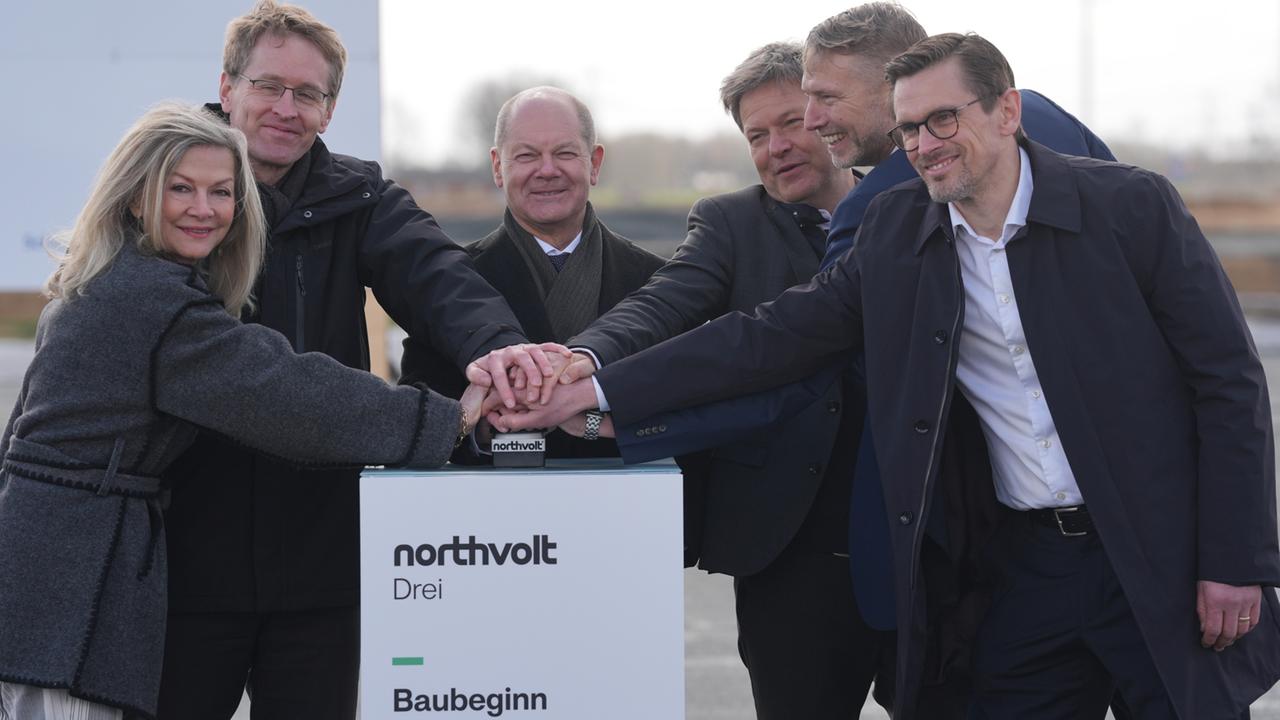analysis
One of the most modern factories for electric car batteries is being built on the German North Sea coast. Can the Swedish Northvolt group break the overwhelming Chinese dominance?
Peter Carlsson, 53, has a vision: The former Tesla manager wants to break into the Champions League of global electric car battery manufacturers and stand up to the dominant Chinese companies. To this end, Carlsson founded the Swedish start-up Northvolt in 2016. And one of the most modern battery factories in the world is now to be built in the far north of Germany, in the Schleswig-Holstein communities of Norderwöhrden and Lohe-Rickelshof.
Batteries for up to a million electric cars
The symbolic groundbreaking ceremony for the “Northvolt Three” gigafactory took place today – in the presence of Northvolt CEO Carlsson and political celebrities such as Chancellor Olaf Scholz, Federal Minister of Economics Robert Habeck and Schleswig-Holstein's Prime Minister Daniel Günther. The Swedish company wants to produce batteries for up to a million electric cars per year here. Production is scheduled to start in 2026 and full capacity will be reached in 2029. The investment volume is 4.5 billion euros.
Chancellor Scholz speaks on the occasion of the start of construction on the Northvolt battery factory.
According to Northvolt, the wind power that is generated there on land and at sea spoke in favor of settling on the west coast of Schleswig-Holstein. Electricity, which the factory needs in large quantities. But in order to make the location attractive to Northvolt, Germany needed even more convincing arguments.
Germany wins Subsidy race
Northvolt originally considered locating its new factory in the USA. Ultimately, the US government's “Inflation Reduction Act” attracted high subsidies there.
How much the Americans ultimately offered is unclear. The fact is: Germany put subsidies amounting to 902 million euros on the table for the Northvolt factory. The federal and state governments are funding the project with around 700 million euros. There are also guarantees worth 202 million euros.
Support from the EU – criticism from economists
The EU Commission also played a role, approving the extraordinarily high subsidies by making use of more flexible state aid regulations for the first time. These are intended to prevent an investment from being relocated to a country outside the EU because higher subsidies are offered elsewhere.
Some economists have criticized the subsidies, including Moritz Schularick, President of the Institute for the World Economy (IfW): “The bottom line is that breaking ground is very expensive.” From an economic perspective, we don't yet know exactly whether such subsidies are really worth the money.
Northvolt factory important for independence from China
The establishment of the Northvolt battery factory in Schleswig-Holstein has a high value for Germany and the EU, although it is difficult to quantify: Europe is thereby securing a key technology for the green transformation. Europe is being strengthened as a technology location – against the previously overwhelming competition from Asia.
China had recently continued to expand its share of the market for electric car batteries. According to a current report by the Korean research institute SNE, six of the ten largest companies in 2023 were from China – led by CATL and BYD. In order to become more independent of Chinese suppliers, the local auto industry needs electric car battery production in its own country or in Europe.
From Tesla's Gigafactory to Northvolt
But does Northvolt really have what it takes to stand up to China? The fact is: Behind Northvolt there are two managers, Peter Carlsson and Paolo Cerutti, who previously worked in leading positions at Tesla and promoted their own battery production there. The Tesla Gigafactory 1 in the US state of Nevada is now considered a role model for the entire industry. Carlsson is CEO of Northvolt, Cerutti is COO and is responsible for operations.
Large European car companies also have a stake in Northvolt, especially Volkswagen: the Wolfsburg-based company is the largest shareholder with around 21 percent. The group of owners also includes BMW and Goldman Sachs. In addition to VW and BMW, Northvolt's customers also include Scania and Volvo Cars.
Hope factor Sodium ion battery
The Swedes' recent successes in developing a sodium-ion battery – a battery without cobalt, lithium, nickel and graphite – also speak in favor of Northvolt. Instead, minerals such as iron and sodium are used here. These are plentiful on world markets, so they do not have to be mined expensively or under environmentally harmful conditions.
The first generation of Northvolt's sodium-ion battery has an energy density of 160 watt hours per kilogram – and therefore has what it takes to revolutionize the battery market. According to experts, this energy density should be sufficient for simple electric cars with a short to medium range. However, later generations should deliver a higher energy density in order to be able to offer a real alternative to lithium batteries, which today already have an energy density of around 250 to 300 watt hours per kilogram.
But the Swedes have to hurry if they want to stand up to the Chinese in the emerging market for sodium-ion batteries. According to the Fraunhofer Institute for Ceramic Technologies and Systems, almost 90 percent of the patents related to sodium technology come from China.





